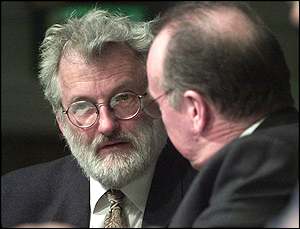
An oath for scientists?
URL: http://news.bbc.co.uk/hi/english/sci/tech/newsid_1250000/1250331.stm
Date accessed: 3 April 2001
Friday, 30 March, 2001, 10:42 GMT 11:42 UK
Leading British scientist Sir John Sulston has called for a scientific equivalent of the Hippocratic oath.
For individual scientists, it may be helpful to have a clear
professional code of conduct - a Hippocratic oath
|
|
Sir John Sulston
|
Sir John, who led the UK effort to sequence the human genome, says such a move is required to ease public distrust of scientists and to prevent conflicts of interest arising where research is exploited for profit.
But academics are divided over whether a scientific oath would be tenable.
"Oaths are not the way ahead," Ray Spier, professor of science and engineering ethics at the University of Surrey, told BBC News Online.
Animal experiments
However, he said that a code of conduct would be a good idea "to improve the trust of lay people in scientists and the work they do".
Spier is preparing a 20-point draft code of conduct for scientists, to be submitted for publication in an ethics journal later this year. Scientists would have to agree to abide by a number of rules, including:
"For individual scientists, it may be helpful to have a clear professional code of conduct - a Hippocratic oath as it were," he wrote.
"The aim would be both to require qualified scientists to cause no harm and to be wholly truthful in their public pronouncements, and also to protect them from discrimination by employers who might prefer them to be economical with the truth."
Categories: 4. Ethical and Social Concerns Arising out of Biotechnology, 39. General Issues about Research